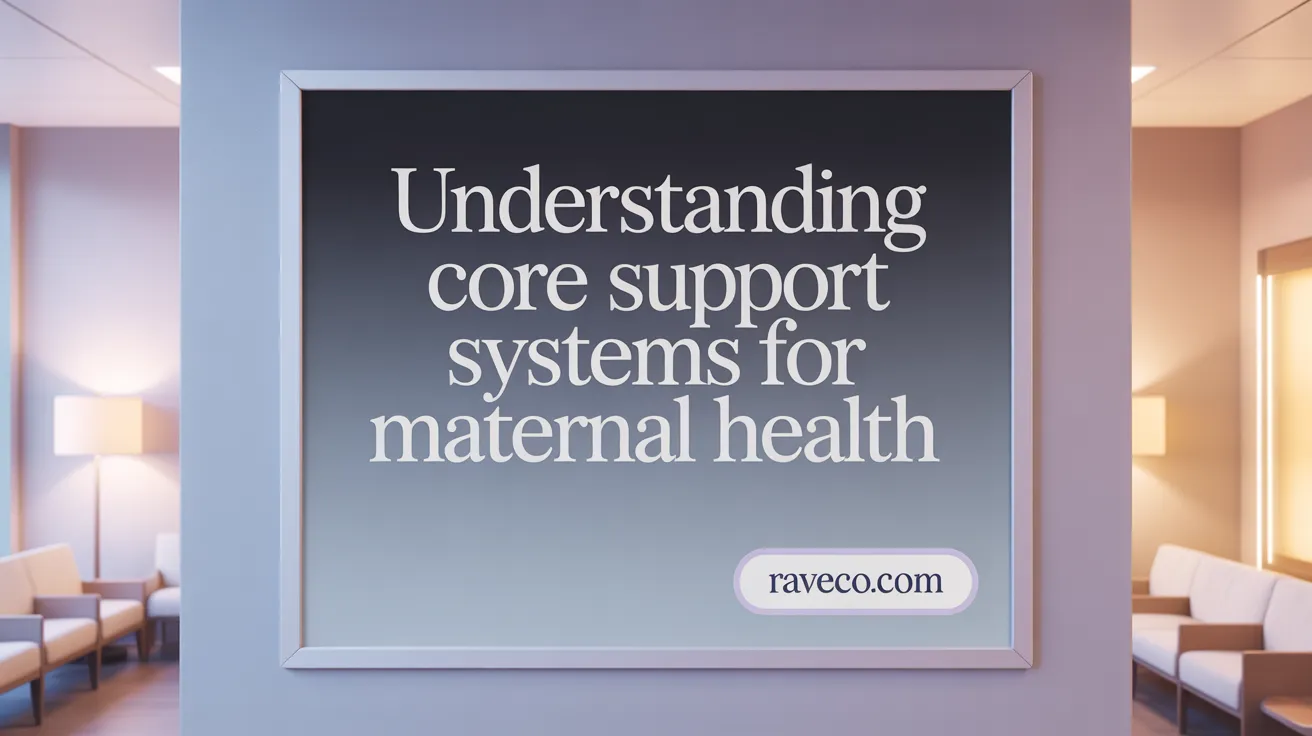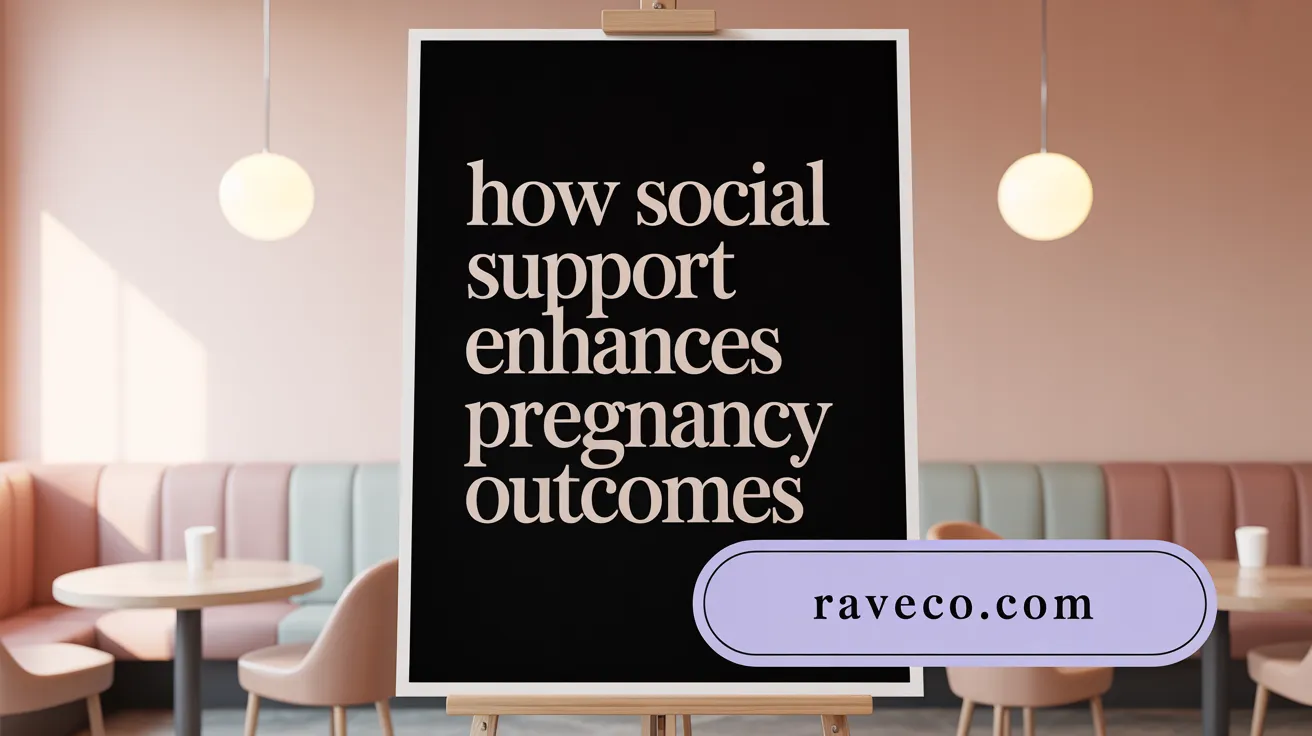Your Guide to Endometriosis: From Symptoms to Advanced Management

Understanding the Vital Role of Support Systems in Pregnancy
Pregnancy is a transformative journey marked by profound physical, emotional, and psychological changes. Navigating this period is significantly eased by having robust support systems that nurture both the mother's and baby's well-being. From emotional reassurance to physical care, support during pregnancy encompasses various dimensions critical to maternal health. This article explores essential support systems during pregnancy, emphasizing emotional and physical care, and offers insights into how families, communities, and healthcare providers contribute to a positive pregnancy experience.
Core Support Systems in Pregnancy: Types, Sources, and Their Significance

What are the core support systems during pregnancy, including their types, sources, and significance for maternal health?
Core support systems during pregnancy are the vital networks and resources that help women navigate the physical, emotional, and practical challenges of pregnancy. They encompass various types, including emotional support during pregnancy, medical support, community support, and practical support.
Emotional support is fundamental during pregnancy. It comes from partners, family members—such as mothers, sisters, and in-laws—and friends who provide encouragement, understanding, and reassurance. This emotional backing helps reduce stress, alleviate anxiety, and foster a positive mental state, which is crucial for maternal and fetal health.
Medical support from healthcare providers, including obstetricians, midwives, and nurse practitioners, ensures ongoing monitoring of the pregnancy. They guide women through necessary checkups, screenings, and manage any health concerns that arise, thereby preventing complications and promoting safe pregnancy outcomes, as highlighted in prenatal care guidelines.
Community support plays an essential role as well. Resources such as local parenting classes, support groups, mental health services like the National Maternal Mental Health Hotline, and online forums offer peer connection and shared experiences. These community-based services are especially important for women from diverse cultural backgrounds or lower-income households who may face additional barriers, providing practical help and emotional solidarity, as described in reports on social support during pregnancy.
Practical support further includes assistance with chores, transportation to healthcare appointments, financial aid, and guidance on nutrition and childbirth preparations. This tangible help diminishes daily stressors, allowing women to focus on their health and well-being, as noted in studies on financial and practical support during pregnancy.
The importance of diversified support lies in its capacity to bolster maternal confidence, resilience, and emotional stability. When women feel supported across multiple domains, they are more likely to experience a healthier pregnancy, better emotional adjustment, and higher confidence in their new role as mothers.
In conclusion, developing and maintaining robust core support systems—comprising emotional, medical, community, and practical resources—is indispensable for maternal health. It not only facilitates healthier pregnancies but also encourages positive birth experiences and smoother transitions into motherhood.
The Importance of Emotional Support: Benefits and Access Points
Why is emotional support during pregnancy important, and what are the benefits and ways to provide or access it?
Emotional support during pregnancy plays a vital role in helping women cope with the many physical and hormonal changes they experience. It is crucial for reducing stress, anxiety, and depression, which are common during this period. By offering reassurance, understanding, and companionship, emotional support enhances both mental and physical health outcomes for mother and baby (Emotional Support for Women During Pregnancy).
Support can come from various sources, including family, friends, healthcare providers, support groups, and community rituals. These relationships provide a mix of emotional, instrumental, informational, and spiritual assistance (Social support during pregnancy). For instance, female networks of mothers, sisters, and friends often share care and encouragement, helping women feel valued and understood (Women's experiences of social support).
Benefits of comprehensive emotional support extend beyond pregnancy; they contribute to smoother labor, better postpartum recovery, and stronger bonding with the newborn. Women who feel supported are less likely to experience postpartum depression and are more confident in their parenting abilities (National Maternal Mental Health Hotline).
Accessing this support involves both proactive and community-based strategies. Engaging with healthcare providers like midwives and obstetricians ensures personalized care (Prenatal care health visits). Additionally, participating in prenatal education classes, joining support groups—whether in-person or online—and practicing culturally sensitive traditional rituals foster emotional resilience (Social support during pregnancy). Family involvement, especially partners who educate themselves and actively participate in appointments and caregiving, significantly enhances emotional well-being (Pregnancy support for fathers).
In today’s digital age, online communities and apps such as Peanut facilitate connections with other expectant mothers, providing additional avenues for emotional sharing and advice (Online support communities during COVID-19). Cultivating a reliable support network with these diverse sources helps women navigate pregnancy with confidence, nurturing their mental health while strengthening bonds that are essential for a healthy pregnancy and postpartum period (Support Systems in Maternal Mental Health).
Physical Care Essentials for a Healthy Pregnancy

During pregnancy, maintaining physical care involves following a balanced diet rich in essential nutrients such as folate, iron, calcium, and omega-3 fatty acids, supported by daily prenatal vitamins (nutrition during pregnancy, Prenatal care health visits, Healthy pregnancy care). It is important to achieve appropriate weight gain based on pre-pregnancy BMI, focusing on gradual and healthy increases with nutrient-dense foods and avoiding weight loss efforts (healthy weight during pregnancy).
Regular moderate exercise, like walking or prenatal yoga, promotes circulation, reduces discomfort, and supports overall well-being. Women should aim for at least 150 minutes of such activity weekly, tailoring routines with healthcare guidance to avoid activities that pose fall risks or abdominal trauma (Physical activity during pregnancy, Exercise during pregnancy, Pregnancy and exercise).
Stay well-hydrated by drinking about 8-12 cups of water daily, which helps prevent dehydration and supports increased blood volume during pregnancy. Good lifestyle practices include avoiding alcohol, tobacco, and certain medications, along with managing stress through relaxation techniques (Healthy habits during pregnancy, Mental health during pregnancy).
Additionally, attending routine prenatal check-ups allows for ongoing health monitoring, fetal development assessment, and early detection of potential concerns (Prenatal care health visits, Healthy pregnancy care, Pregnancy care overview). Prioritizing good sleep hygiene, nutrition, and overall wellness creates a foundation for a healthy pregnancy and supports healthy fetal development (Dos and Don'ts of Pregnancy, Managing Stress in Pregnancy).
Maternal Mental Health: Challenges and Support Options

What are common mental health issues during pregnancy, and what support options and resources are available for emotional well-being?
During pregnancy, many women experience emotional challenges, with common issues including anxiety, depression, prenatal stress, and thoughts of self-harm or suicidal ideation. These mental health conditions can significantly affect both mother and baby if left unaddressed. Recognizing early symptoms such as persistent sadness, worry, feelings of hopelessness, fatigue, or difficulty bonding is vital for timely intervention.
Healthcare guidelines from the American College of Obstetricians and Gynecologists (ACOG) recommend routine screening for depression and anxiety at various points during pregnancy. Early detection through education helps women and their support systems understand potential warning signs and reduces stigma around mental health discussions (NHS - Mental health during pregnancy).
Support resources are readily available to promote emotional well-being. The National Maternal Mental Health Hotline offers 24/7 free and confidential assistance, providing counseling, resources, and referrals. Charitable organizations like Postpartum Support International (PSI) provide additional support, including support groups, training programs, and online resources tailored for diverse communities.
Crisis helplines such as the 988 Suicide & Crisis Lifeline are essential for immediate assistance during moments of acute distress. Community programs—including Lifeline for Moms and POEM—offer peer support, education, and culturally sensitive services, enabling women to access help within their cultural context (Maternal Mental Health Support System).
Overall, integrated care that emphasizes education about mental health issues, accessible professional support, active screening, and the availability of crisis helplines can dramatically enhance emotional well-being during pregnancy and postpartum, safeguarding both maternal and infant health (Maternal Mental Health Integration).
The Impact of Social and Community Support on Pregnancy Outcomes

How do social and community support impact pregnancy outcomes?
Support from social and community networks plays a crucial role in shaping positive pregnancy outcomes. Emotional reassurance from partners, family members, friends, and social groups helps to reduce feelings of stress and anxiety that often accompany pregnancy. When women receive emotional support , they experience less depression and improved mental health, which directly benefits fetal development and the mother's physical health.
Practical assistance, including financial aid, help with household chores, errands, and attending healthcare appointments, substantially eases the physical burdens of pregnancy. This tangible support contributes to better nutritional intake, adherence to medical advice, and increased rest, all vital for a healthy pregnancy.
Access to informational support through healthcare professionals, community support groups, and online resources also equips women with knowledge about prenatal care, reducing fear and uncertainty. Traditional rituals, spiritual practices, and culturally sensitive community programs further provide comfort, stress relief, and a sense of cultural continuity.
Research indicates that robust social support networks are linked to higher rates of healthy pregnancies, fewer complications, and higher rates of term deliveries. Community programs, including prenatal education, breastfeeding support, and mental health services, foster a supportive environment that enhances maternal resilience. Overall, social and community support systems have an immensely positive impact on both maternal and neonatal health, promoting safer and more satisfying pregnancy experiences.
Empowering Partners and Family Members for Effective Support
What strategies can help partners and family members provide effective emotional and practical support during pregnancy?
Providing meaningful support during pregnancy requires a combination of open communication, active involvement, and empathy.
Partners and family members can start by engaging in honest conversations about the expectant mother's feelings, concerns, and needs. Attending prenatal care appointments and childbirth classes together not only offers practical assistance but also shows solidarity and shared responsibility.
Practically, helping with daily chores like household tasks, cooking nutritious meals, and managing errands reduces stress and physical strain for the mother. Making lifestyle changes, such as quitting smoking or reducing alcohol intake, can also be supportive (Healthy pregnancy care).
Emotionally, offering reassurance, listening without judgment, and validating her feelings helps build confidence and emotional resilience (Emotional support during pregnancy). Gentle physical support, like massages, warm baths, or simply providing comfort and rest, nourishes emotional well-being.
Involving children and extended family in preparations creates a nurturing environment that emphasizes teamwork. Understanding the stages of labor and discussing birth plans can empower both partners and the mother, making her feel more prepared and supported (Support during labour and childbirth).
Through these strategies—effective communication, active participation, and heartfelt empathy—partners and families can significantly improve the pregnancy experience, fostering a supportive environment for the mother and the growing baby (Social support during pregnancy).
Comprehensive Strategies for Maintaining Physical and Emotional Health

Maintaining good health during pregnancy involves a multifaceted approach that addresses both physical and emotional aspects.
For physical well-being, women are encouraged to follow a balanced diet rich in fruits, vegetables, whole grains, lean proteins, and dairy. Regular prenatal check-ups are vital for monitoring fetal development and catching any health issues early. Gentle exercises like walking, swimming, or prenatal yoga, approved by healthcare providers, can help manage weight, reduce discomfort, and improve overall fitness (Physical Activity Recommendations for Pregnant Women, Exercise during pregnancy, Pregnancy and exercise).
Emotionally, managing stress is crucial. Techniques such as relaxation exercises, mindfulness, and engaging in support groups or talking with trusted loved ones can create a strong emotional support system (Mental Health During Pregnancy, Emotional Support During Pregnancy, Support Systems in Maternal Mental Health). Open communication with healthcare providers about feelings of anxiety or mood swings allows for timely intervention, which might include counseling or therapy (Mental health during pregnancy, Mental Health During Pregnancy). Addressing mental health concerns proactively promotes resilience and a positive pregnancy experience (supporting women's mental health during pregnancy).
Avoiding harmful substances like alcohol, cigarettes, and recreational drugs is essential for both fetal and maternal health (Healthy Pregnancy Guidelines, Mental illness overview, Pregnant and postpartum behavioral health). Prioritizing self-care activities—rest, adequate hydration, and stress reduction techniques—further enhances emotional and physical stability (Healthy Pregnancy Guidelines, Emotional Support for Women During Pregnancy).
Incorporating medical support with social and self-care strategies forms a comprehensive plan that nurtures overall health during pregnancy (Social support during pregnancy, Support During Pregnancy and After Birth, Healthy Pregnancy Care). This approach helps women feel empowered, reduces complications, and supports a healthy transition into motherhood.
Supporting Mothers: The Foundation for Healthy Pregnancy and Beyond
Robust support systems during pregnancy are vital pillars for nurturing the physical and emotional health of mothers and their babies. Emotional encouragement, practical assistance, medical guidance, and community resources weave together to form a safety net that reduces risks, enhances confidence, and promotes resilience throughout pregnancy and into the postpartum period. By understanding the multifaceted nature of support — encompassing nutrition, safe physical activity, mental health care, and interpersonal connections — families and healthcare providers can collaboratively foster thriving environments for expectant mothers. Prioritizing these essentials lays a strong foundation for healthier pregnancies, smoother births, and more positive lifelong outcomes for families worldwide.





.png)